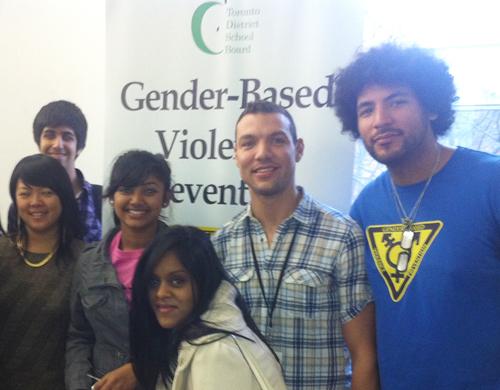The Toronto District School Board (TDSB) is taking a stand against gender-based violence with three new groundbreaking initiatives that will make schools safer for all students, teachers and staff, board officials say.
At last week’s Unity Conference at the 519 Church Street Community Centre – an annual event that brings together youth and educators from across the province in support of gay-straight alliances in schools – Vladimir Vallecilla, a gender-based violence prevention worker with the TDSB, said students often have nowhere to turn when faced with homophobic and transphobic bullying.
The new initiatives were announced by education director Chris Spence and will soon be unrolled board-wide.
Michelle Cho, student equity program advisor for the TDSB, says the new initiatives are a first in Canada. There has never before been a system-wide promotion of gender-based violence prevention, she says.
“This is a pretty significant development. It’s historic,” she says. “The TDSB as an entity has never taken this on system-wide, so it’s having huge ripple effects.
“We know that homophobia and transphobia have existed in our schools for a long time. It’s just being highlighted much more in the media now. There’s a real crisis that’s gone unnamed in our schools. This needs to be talked about.”
Dubbed the Positive Space campaign, middle school and secondary teachers will soon be trained by a positive space representative to act as a point of contact for students dealing with homophobia or transphobia, Vallecilla says.
“[Students] will be able to contact this person in the school and look for support,” he says. “Obviously, that teacher wouldn’t have the expertise of a principal or social worker, but they will be trained to direct that information to the social worker or the administrator, and then to our office for greater school-wide support.”
The positive space campaign was developed based on the need that exists in schools, the need to provide training for teachers, he says. The training will happen at the TDSB’s Gender-Based Violence Prevention office.
“These will have a huge impact on students,” he says. “Now there will be a person in the school who will use all the media and communication tools that we have in our system. This person would be the in-between, connecting that student for greater support in the school or outside the school.”
Another initiative, the peer support network, is all about education, he says. It will give students the tools to understand how the media shapes and forms negative ideas about gender, Vallecilla says.
Students in Grades 8, 9 and 10 will be trained as peer educators through the TDSB on Nov 30, with follow-up work all throughout this year and next year, he says.
“The idea is to teach students how to make creative media and facilitate workshops for other students on gender-based violence prevention,” he says. “An example would be taking images from current media, Disney, pop culture, then discussing and breaking down how gender has been socialized into students.”
The third campaign is about recognizing gay-straight alliances in the school system that are having a positive impact on students. In Toronto, there are currently about 25 gay-straight alliances, Vallecilla says.
“We have a number of GSAs in the system, but we’d like to have a lot more,” he says. “By acknowledging great ones, it will encourage other schools to develop new ones.”
Cho says the new initiatives are not merely a response to the recent bullying-related suicides. They have been in the works for a while.
Last year, Minister of Education Leona Dombrowsky made an amendment to the Education Act, introducing Bill 157, which ensures increased protection in schools for all students.
“It’s addressing gender-based violence,” she says. “That means every teacher, support staff member, guidance counsellor, teaching assistant, administrative staff member, principal or vice-principal must report any incident that can be viewed as unsafe to the school community, which now includes homophobia, transphobia, sexual harassment or sexual misconduct.
“At the end of the day, this isn’t just about policies. There are people being affected.”

 Why you can trust Xtra
Why you can trust Xtra


